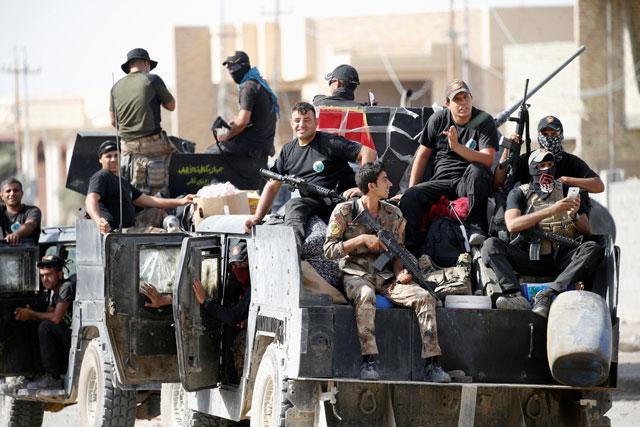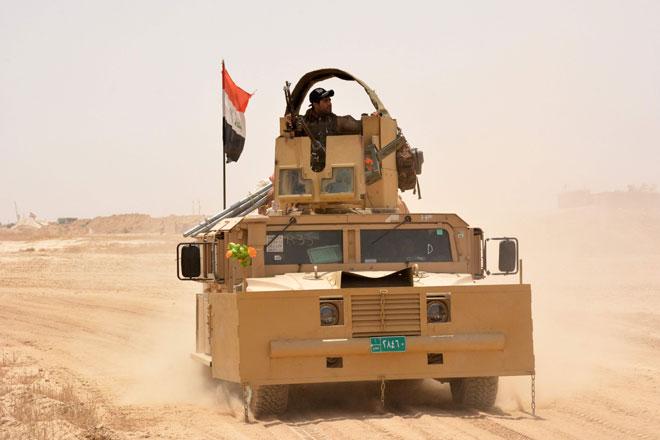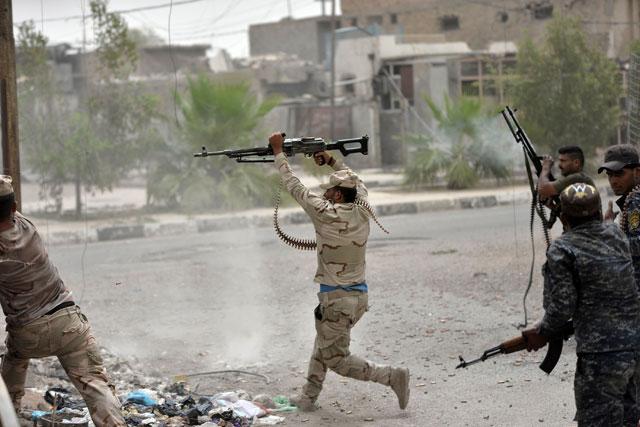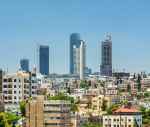You are here
Iraq takes full control of Fallujah from Daesh
By AFP - Jun 27,2016 - Last updated at Jun 27,2016

Iraqi counterterrorism forces gather in Fallujah, Iraq, on Sunday (Reuters photo)
FALLUJAH, Iraq — Iraqi forces took the Daesh terror group’s last position in the city of Fallujah Sunday, establishing full control over one of the extresmists’ most emblematic bastions after a month-long operation.
Prime Minister Haider Al Abadi had already declared victory on June 17 after Daesh defences collapsed, with Iraqi forces facing only limited resistance in subsequent clearing operations.
The offensive saw tens of thousands of civilians risk death to flee their homes, leaving Iraq to grapple with a humanitarian crisis as its forces prepare to attack the country’s last remaining major Daesh hub of Mosul.
“This is joy for all Iraqis and it’s the right of all Iraqi people to celebrate the retaking of Fallujah,” Abadi said, speaking to Iraqiya state television outside Fallujah hospital.
Victory for the security forces in Fallujah came when elite forces retook Jolan, a northwestern neighbourhood of Fallujah where the last Daesh militants in the city were believed to be holed up.
“It did not take more than two hours for CTS to retake Jolan,” said Sabah Al Noman, spokesman for the elite counterterrorism service that has been leading the fight.
“Daesh did not fire a single bullet,” he said. “This proves that Daesh was defeated even before our forces got there.”
Several other senior military commanders said only small pockets of Daesh militants remained in the Fallujah area.
After a gruelling month-long campaign, fighters rejoiced at the liberation of what was the first Iraqi city to fall out of government control two and half years ago.
“Today, I am... very happy,” said Mohammed Abed, a major with the joint rapid response force and a Fallujah native. “Fallujah is very beautiful... It is very unfortunate what happened to Fallujah.”
Major blow to Daesh
The offensive began on May 22-23 with an initial phase of staging operations aimed at tightening a months-old siege on Fallujah and led by the Hashed Al Shaabi, a paramilitary organisation dominated by Tehran-backed Shiite militias.
Qassem Suleimani, the powerful head of Iran’s elite Revolutionary Guards’ overseas operations arm, was more visible than ever before in Iraq during the early days of the operation.
The US-led coalition offered some aerial support but was less involved than six months ago during the operations to retake Ramadi, the capital of Anbar province in which Fallujah is also located.
The US had favoured focusing the battle on Mosul, the country’s second city, where Daesh proclaimed a “caliphate” straddling Iraq and Syria two years ago almost to the day.
Wearing a scarf with the national colours around his neck in Fallujah Sunday, Abadi vowed: “We will raise the Iraqi flag in Mosul soon.”
While some pockets of Daesh militants on the outskirts of Fallujah remain to be flushed out, the extremist organisation does not appear in a position to contest the area any longer.
The loss of Fallujah, which looms large in extremist mythology and in 2004 saw US forces suffer some of their worst losses since the Vietnam War, is a blow to Daesh.
“The biggest victory achieved so far in the battle against Daesh is the battle of Fallujah,” Hadi Al Ameri, a key Hashed Al Shaabi commander, told AFP there.
The extresmist organisation has lost several key leaders in air strikes, more than two-thirds of the territory it controlled in Iraq two years ago and it faces multiple offensives in Syria.
Humanitarian disaster
Facing a seemingly inexorable decline of its de facto state, Daesh had reverted to old tactics and recently ramped up bombings against key infrastructure and civilian targets.
But few major attacks have been reported in Baghdad since the start of the Muslim fasting month of Ramadan.
The aid community was largely caught flat-footed however by the scope of the humanitarian crisis that resulted from mass displacement out of Fallujah.
According to the United Nations, 85,000 people were forced to flee their homes in the past month, leaving many crammed in hastily set-up camps with scant food or water.
The Norwegian Refugee Council (NRC), one of the leading groups that has provided assistance to the displaced since the start of the operation, has warned of an “impending disaster”.
Lt. Gen. Abdelwahab Al Saadi, the overall commander for the Fallujah operation, said limited damage had been caused to the city by the fighting.
“The percentage of destruction in Fallujah is no more than 10 per cent,” he told AFP.
That assessment is a massive improvement on the operation that saw Ramadi be retaken six months ago but also extensively destroyed.
Abadi said he hoped the displaced could return to their homes in Fallujah soon but the NRC and the United Nations warned the government should proceed with caution.
“We urge prudence and restraint in the communications with the displaced families as we have seen how, elsewhere, areas recaptured by Iraqi forces are still unsafe,” NRC’s Iraq Director Nasr Muflahi said.
Related Articles
BAGHDAD — Iraqi forces hunted extremists in their last Fallujah redoubts Wednesday as tens of thousands of displaced civilians massed in ove
FALLUJAH, Iraq — Iraqi forces hunted down holdout militants in Fallujah Saturday after retaking the city centre and trained their sights on
FALLUJAH, Iraq — Iraqi forces closed in on the last neighbourhood of Fallujah still held by the Daesh terror group Thursday while aid groups



















